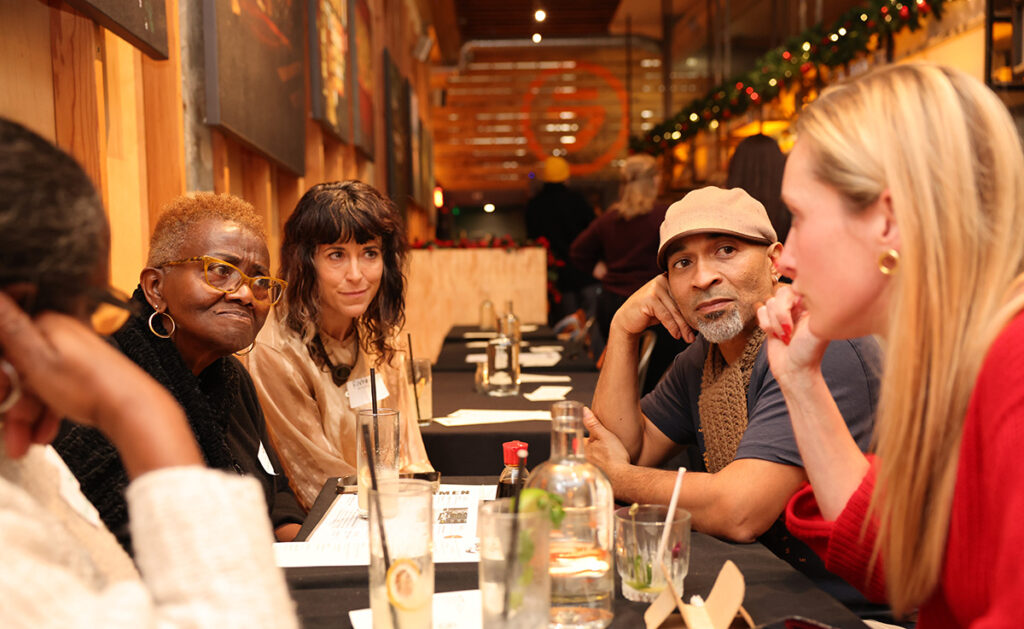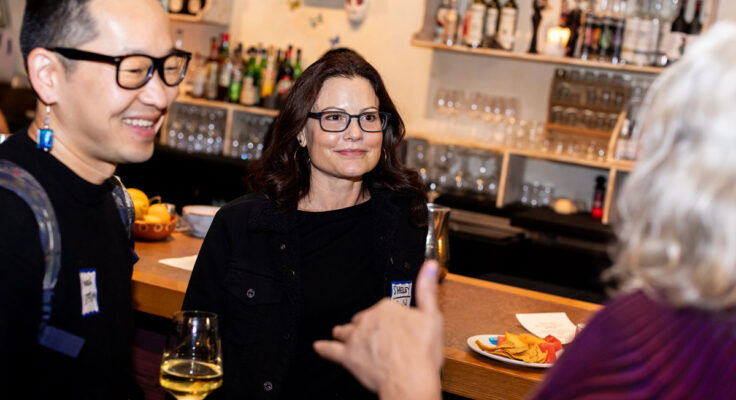When the Kenneth Rainin Foundation began our formal grantmaking in 2009, our instincts were to listen to our communities and build trusting relationships. Fifteen years later, our philanthropy is explicitly committed to trust-based practices that center the wisdom, voices and self-defined needs of our communities. This is changing the way we work and lies at the heart of our equity journey. What follows are highlights of our progress toward our vision of authentic, equitable relationships with the communities we serve.
Change Happens With Trust
At its core, trust-based philanthropy is about redistributing power—systemically, organizationally and interpersonally—in service of a healthier and more equitable nonprofit ecosystem. On a practical level, this requires building relationships based on transparency, dialogue and mutual learning.
The Trust-Based Philanthropy Project, a peer-to-peer funder initiative, offers resources to grantmakers to achieve equitable practices. For example, when we looked to the field for guidance on stakeholder compensation practices and found little data, our process to develop an equitable policy was guided by trust-based values that center our relationships. We saw this process and the outcomes as an opportunity to hold ourselves accountable and to be transparent about the issues we’re trying to solve. Sharing what we learn builds awareness and connections that are important to sector-wide transformation. This is how change happens. The more we learn and share, the faster we make progress together.
Sharing what we learn builds awareness and connections that are important to sector-wide transformation.
Centering Communities In Our Grantmaking
The trust-based practice of shifting power to our grantee communities leads to mutually accountable relationships. We have made key changes in our programs as a result. In the Arts, our popular “Let’s Talk: What Artists Need To Thrive” series centered Bay Area artists’ voices from historically excluded communities in conversations with funders to examine the central question: what do artists need to thrive? And to make our grant decisions more inclusive and transparent, we brought a panel of Bay Area Artists together to make funding recommendations for our New and Experimental Works (NEW) Program. We continue to work on improvements to make our application process less burdensome and are thrilled that a growing number of arts funders are embracing the Common Application for the Arts. We are considering other efficiencies, such as using video responses in grantee reporting and shifting the burden of data collection to funders.
The trust-based practice of shifting power to our grantee communities leads to mutually accountable relationships.

In Education, the momentum to see literacy as a civil rights issue inspires our grantmaking. A recent assessment of our impact by Informing Change affirmed the importance of parental involvement and implementing programs that are rooted in evidence, a practice that counters decades of inequities. It also included a recommendation to explore other pathways for funding literacy intervention, which is the goal of our new Early Care Spaces grant program. This is our first open grant program in Education and it will support career advancement and professional development for Black early care providers. Later this year we will convene a Community Advisory Council to help us develop a new Education grant program.
To improve health outcomes for patients of color, our Health Program is addressing the lack of racial representation in healthcare and biomedical research by working with new partners to develop a robust pipeline of researchers. First-time awards in 2023 to the Association of Black Gastroenterologists and Hepatologists, including support for mentorship, and to Color of Gastrointestinal Illnesses for patient education and awareness programs, reflect our commitment.
Adapting Our Practices
Our staff continue to develop resources and tools for shifting our practices across all areas of leadership, structure and culture. An internal Trust-Based Philanthropy Work Group is surveying our staff and collaborating on recommendations that we can adopt organization-wide.
We recently expanded our Grants Management & Learning Team to ensure that our grantmaking practices are equitable, accessible and accountable. Following a year of testing and development, this team will oversee and implement the Foundation’s equity-centered Learning and Evaluation framework.
In our external communications, we seek to make meaningful connections with our audiences. Our Communications Team launched a new website with improved accessibility and better user experience. They also shifted their practices to give grantees and partners more agency in telling their stories. Supporting this work is the Diversity and Inclusion Strategies in Communications Work Group, which is led and staffed by the Communications Team and includes representatives from each program area and grants management. It has rolled out staff resources to ensure that our communications reflect our values and commitment to equity and accessibility. The group is currently organizing accessibility trainings for staff and developing work plans with departments to fulfill the Disability & Philanthropy Forum’s Disability Inclusion Pledge. This pledge encourages grantmaking organizations to integrate disability into their social justice work. It’s another great example of how transparency and resources are helping to create sector-wide transformation.
Making An Impact Beyond Grantmaking
The Rainin Foundation is dedicated to going beyond grantmaking to build an equitable and just society. Our Investment Team’s Program-Related Investment Fund will give us a chance to explore further impact and mission related investing opportunities. A few months ago, I joined Victoria Pozzato, our Investment Operations Analyst, at the Mission Investors Exchange conference. I was inspired to see over 700 philanthropy leaders gathered who are deploying more of their assets to support their communities and constituents. We will be sharing details about our own efforts soon.
Community partnerships and listening to those most impacted by the issues have been central to advancing our strategies in the Arts, Education and Health. The people we serve have been generous with their ideas and perspectives, and instrumental in shaping where and who we are today. As I reflect on our 15th anniversary this year, I am deeply gratified by how much we have learned from them. I believe their generosity is rooted in their trust that we will listen and act. They know we are in this with them, with community at the center of our mission.
Community partnerships and listening to those most impacted by the issues have been central to advancing our strategies in the Arts, Education and Health.
About the author: Shelley Trott is Chief Program Officer and oversees Communications, Grants Management and Programs.

